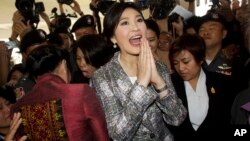Thailand's Supreme Court ruled Thursday that a criminal case against the country's last elected prime minister could proceed. If convicted, Yingluck Shinawatra could be imprisoned for a decade. Her supporters see this as part of the junta's campaign to permanently eliminate the Shinawatra clan from Thai politics.
Thailand's Supreme Court has set May 19 as the date for the first court hearing in a criminal case against former prime minister Yingluck Shinawatra.
The high court, in announcing acceptance of the case from the attorney general's office, declared it had jurisdiction.
Yingluck was forced from office shortly before last year's military coup. She is accused of dereliction of duty and negligence in connection with a bungled rice-pledging scheme. Her government paid farmers twice the market rate for their crops.
The project was popular among her core rural supporters in the north, who primarily compose the Red Shirt movement, as opposed to the Yellow Shirts, favored by the Bangkok middle class and staunch monarchists.
On her Facebook page shortly after the Supreme Court announcement, Yingluck defended the scheme, saying that it had benefited farmers and "I did nothing wrong."
The rice subsidy plan was the catalyst for a junta-appointed legislative assembly in January to impeach Yingluck -- a move intended to ban her automatically from politics for a five-year period. A criminal conviction could put her behind bars for years beyond that period.
Kyoto University associate professor Pavin Chachalvalpongpun, speaking to VOA from Kuala Lumpur, Malaysia, sees the case as a way for the military to justify its takeover of the government and the Constitutional Court's ordering Yingluck to step down prior to the coup.
“But I think this is quite dangerous because it could be counter-productive against the military junta, as well. Because more and more people look at it and see that this is a case once again of injustice, a double standard,” said Pavin.
Pavin, with the university's Center for Southeast Asian Studies, and who is considered a fugitive by Thailand's military junta, said Yingluck is unlikely to get a fair trial. He contends the judiciary in Thailand has been greatly politicized since 2008, when Yingluck's brother, Thaksin, was convicted on a corruption charge two years after a coup ousted him as prime minister.
There is growing speculation Yingluck might also flee the country to avoid imprisonment, as her brother did. Pavin said the junta and the judiciary might not mind her doing that.
“Considering that Yingluck is still very much popular and any difficult or harsh verdict against her would bring up that level of sympathy among the Red Shirt supporters that might not be good for the military government. In the military and in the judge's hearts they might want her to run away like her brother," he said.
Yingluck has insisted she will remain in the country to fight the charges against her.
The Shinawatras, or political parties supported by them, have won every election in Thailand since 2001.
The current prime minister, retired general Prayuth Chan-ocha, who led the May 2014 coup, has promised elections -- perhaps early next year -- once a new draft constitution is implemented and reforms are in place.
However, there is growing discomfort about the restrictions on political parties in the proposed charter and Prime Minister Prayuth has expressed his own frustration with critics, warning dissent could delay a return to democracy.
The kingdom remains under martial law, which the junta contends allows it to make arrests without warrants.
Opponents of the junta accuse it of proceeding with politically motivated prosecutions. But public protests about these concerns have been sparsely attended and infrequent, with police and troops quickly racing to any demonstration sites to subdue peaceful dissent.
The international rights organization Human Rights Watch on Wednesday called for the junta to end secret military detentions. The group says since the May, 2014 coup the junta "has detained hundred of politicians, activists, journalists and people they accuse of supporting the deposed government, disrespecting or offending the monarchy, or being involved in anti-coup protests and activities."
Some analysts predict the military will remain in control of the government to shepherd Thailand through the future stressful period of royal succession.
The widely-revered King Bhumibol is 87 and has been in poor health for years. His heir apparent, Crown Prince Vajiralongkorn, 62, does not command the same level of respect as his father, currently the world's longest reigning monarch.
Open discussion about the royal family is not tolerated under the kingdom's harsh lese majeste laws.







